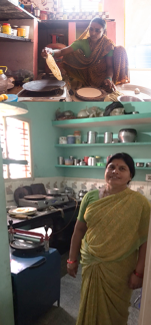<p>March 2018—Sumangala Patil is a 45-year-old home-based woman entrepreneur who lives with her husband and two school-going daughters in Narendra village, which is located in the Dharwad district of the southern Indian state of Karnataka.</p>
<p>Patil, like most women in her village, provides financial assistance to her family by selling <em>rotis</em> (Indian flat bread) made from a locally grown crop called <em>jowar</em>. But like most households in her village, Patil’s business was regularly disrupted due to an unreliable power supply.</p>
<p>“Due to frequent power cuts in my village, I was only able to make 150-200 rotis a day,” says Patil. “That’s an earning of only $10 per day, meaning I was unable to meet the large demand in the market.”</p>
<p>To help women like Patil manage their businesses well and increase their daily earnings, USAID, in partnership with the SELCO Foundation, launched the program “Technology Innovation for Sustainable Energy Access and Poverty Alleviation”<strong> </strong>in 2016. Patil borrowed 30,000 Indian rupees (Rs.), or $469, to replace her electric roti maker with an efficient solar-powered roti rolling machine, specially designed by SELCO’s energy engineers.</p>
<p>Under the program, SELCO combines technology, financial and social services for people who are in greatest need of energy access and delivery. SELCO identifies clean energy solutions that are easy to apply and can assist the poor in income-generation activities, thus leading to improved well-being, health, education and livelihoods. </p>
<p>“Most families in the village are day laborers, unable to invest a lot in microenterprises. That is why we designed a simple financial model under this USAID program called the Micro Units Development and Refinance Agency scheme for women entrepreneurs. The loan facility enabled Patil to own the solar machine on a monthly payment of only Rs. 963 ($15),” says Suresh Savalgi of SELCO.</p>
<p>For Patil, the switch to reliable solar energy and the cost of the machine has been worth every <em>paisa</em>. “It works as good as the electric machine. In fact, it is much better,” she says with a smile. “After buying the roti rolling machine, I am making between 600 to 800 rotis a day and I’m earning more than triple what I used to earn before. This is all because I don’t have to worry about power cuts anymore.”</p>
<p>Aided by reliable after-sales service as part of the SELCO program, Patil believes she will be able to deliver much more with the machine. “So far, I have had no issues with the machine, and even if I didn’t understand anything, the project staff has been very helpful in resolving any of my concerns. It’s like this machine was made just for me,” laughs Patil.</p>
<p>The solar-powered roti rolling machine is one example of how a simple energy intervention can create avenues for entrepreneurs to improve their livelihoods. By reaching a larger customer base, Patil hopes to earn more, save more and send her girls to college.</p>
<p>“I hope they too can study enough to create something like this that can help a lot of other women improve their lives and lives of their families,” says Patil.</p>
<p>USAID’s Technology Innovation for Sustainable Energy Access and Poverty Alleviation program, which runs from 2016 to 2019, is designed to push people permanently out of poverty by using sustainable energy as a catalyst. So far, 20,000 people have benefited from the program through access to innovative clean energy solutions to improve their livelihood and well-being.</p>
<p><strong>LINKS</strong></p>
<div class="wysiwyg-style-related-link"><strong><a href="https://www.usaid.gov/india">USAID's mission in India</a></strong></div>
<div class="wysiwyg-style-related-link"><strong><a href="https://www.usaid.gov/news-information/frontlines/january-february-2017…; Is for ‘Basics’</a></strong></div>
<div class="wysiwyg-style-related-link"><strong><a href="https://www.usaid.gov/news-information/frontlines/may-june-2016/clean-w… Water Means Life to These Indian Moms</a></strong></div>
<p>Follow <a href="https://twitter.com/USAID_India"><strong>@usaid_india</strong></a> … href="https://www.facebook.com/USAIDIndia"><strong>Facebook</strong></a>, on <a href="http://www.flickr.com/photos/usaidindia/"><strong>Flickr</strong></a>, on <a href="http://www.youtube.com/USAIDIndia"><strong>YouTube</strong></a></p>
,“It works as good as the electric machine. In fact, it is much better.”

USAID
